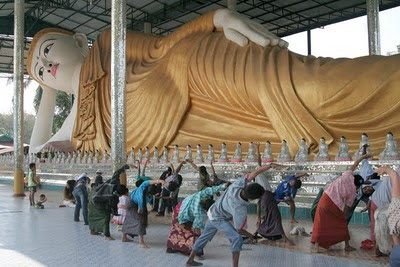For the past seven years the Mae Tao Clinic has run a voluntary HIV counselling and testing program. Every month the clinic hosts a get-together for the program members, usually to the Tai Watanaram monastery. Today, about forty patients came, some with their families. They took a yoga class at the foot of the monastery's three-story reclining Buddha while their children ran around.
Naturally the program members are all HIV positive, and many have additional problems like tuberculosis, liver disease and gynaecological problems, but they all look young and healthy. They're in their twenties, many with children. Of course those who are very sick probably don't come to the group outings, nonetheless all the vibrant looking people here are infected.
Saw Than Iwin is the program manager. He's an angular young man from Burma, living here and working for the Mae Tao Clinic illegally. He says that when the program started between 60 and 80 people volunteered to be tested for HIV every month. Over the past few years it's levelled off at 100 at month. Since the Mae Tao Clinic caters to the Burmese border community, it's Burmese who are in this AIDS group. About half of them live in Burma and cross over for treatment, and outings like today's.
“A very small percent knows about HIV and how it's transmitted,” says Iwin of the patients coming from Burma. There is some HIV-AIDS education within Burma, but it is only delivered by NGOs like UNICEF, mainly on TV. “Still not enough,” Iwin says.
Iwin and the program's staff are busy with counselling, explaining treatment and organizing program events. The members are like people anywhere else in the world. They complain if outings aren't interesting, make excuses about not using condoms. As each patient is different (some have other illnesses, some are less diligent about taking the anti-retroviral drugs supplied by the city hospital, some can afford a better diet and more relaxed lifestyle than others) no one can predict how long any of them will live.
The commonest way to become infected in the Mae Sot-Myawaddy area is through sexual transmission, but some others are victims of poisonous blood transfusions. That's how one 14-year-old girl in the group became infected several years ago. Iwin says her family brought her in for testing after she became mysteriously ill following her transfusion. The tests came back negative, but she continued to get inexplicably sick. When the family brought her back for another HIV test they learned she was indeed infected. Still, Iwin says the patients are all counselled not to worry about the future.


No comments:
Post a Comment